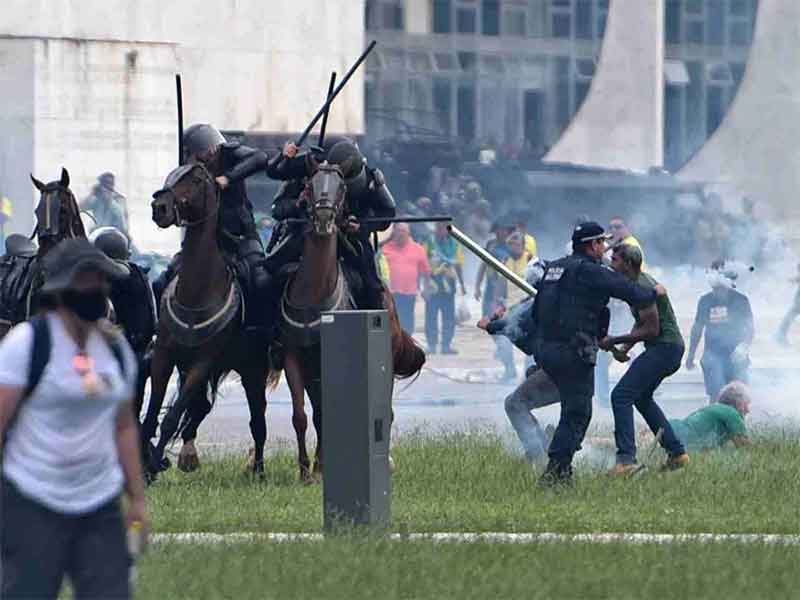
Brazil’s former leftist president, Luiz Inacio Lula da Silva, scored a fresh legal victory on Monday after a federal court acquitted him of passive corruption charges relating to alleged political favors, citing lack of evidence.
In 2017, Lula was accused of having granted political favors to automobile companies in exchange for donations of 6 million reals (around $1.2 million) to the campaign of his Workers’ Party (PT). The charges against the ex-president and other officials were filed after ‘Operation Zelotes’, which was launched by police to investigate alleged fraud and bribery in the sector.
But on Monday, federal judge Frederico Viana ruled that the case against the former president “lacks elements” that can substantiate any conviction against him and the other defendants.
“It is prudent and reasonable to pronounce an acquittal” of the ex-president, his former chief of staff, Gilberto Carvalho, and five other officials and businessmen, the judge said.
During his testimony last year, Lula denied the accusations, insisting that he never did any favors for the automobile firms.
In March, the court annulled all sentences handed to the 75-year-old political veteran under ‘Operation Lava Jato’ (‘Car Wash’) – a major anti-graft investigation in which three ex-presidents and numerous officials were indicted.
That ruling gave Lula the right to run for president again in 2022. He has not yet announced plans to join the race, but recent polls put him ahead of Brazil’s current leader, Jair Bolsonaro, by 41% to 23% in the first round.
Lula remains highly popular in the country, which underwent a period of rapid economic growth during his years in office from 2003 to 2010, and saw millions escape poverty through his welfare programs.
An earlier report said:
Luiz Inacio Lula da Silva, who started out a shoeshine boy and became the most popular president in Brazilian history, has racked up a lifetime of improbable victories.
Now, as he eyes a run against far-right President Jair Bolsonaro next year, the leftist leader is seeking another: win back the political center that abandoned him in disgust when he was jailed for corruption in 2018.
It is still early to predict the October 2022 election, but polls show it shaping up as a Bolsonaro-Lula showdown, likely headed for a runoff.
That means the next leader of Latin America’s largest economy may well be decided by a battle for the grudging votes of the more than one-third of Brazilians who intensely dislike both.
Pulling off a presidential comeback would be nothing short of astounding for Lula, whose towering legacy collapsed when he was convicted of taking bribes – part of a massive investigation into a multi-billion-dollar corruption scheme involving state-run oil company Petrobras.
But it would not be the first surprise from the former steelworker and union leader, who rose from poverty to become a two-term president from 2003 to 2010, leading Brazil through a transformative boom.
To pull it off, the charismatic but tarnished veteran would have to win back at least some of the middle-class voters and business elites who punished his Workers’ Party (PT) at the polls in 2018.
In a deeply polarized Brazil, Lula is striving to sell himself as a moderate to the alienated middle.
“Lula is a versatile animal who has gone back and forth over the past four decades, from far-left in the 1980s to a centrist partnering up with conservatives” in the 2000s, said political scientist Oliver Stuenkel of the Getulio Vargas Foundation.
“Now he’s back in governing mode,” he told AFP.
“He’s clearly positioning himself more as a centrist.”
‘Peace and love’ Lula
Lula, who spent 18 months behind bars, regained his eligibility to run for office in March, when the Supreme Court annulled his convictions on procedural grounds.
He wasted no time holding a campaign-style press conference, where he attacked Bolsonaro and laughed off the 66-year-old incumbent’s warnings that he is a radical.
“Do not be scared of me. They say I am a radical because I want to get to the root of this country’s problems,” he said.
Lula has not officially declared himself a candidate.
But he flew to Brasilia earlier this month for meetings with a host of political bigwigs, including from the powerful center-right.
He then had lunch in Sao Paulo with longtime political enemy Fernando Henrique Cardoso, his centrist predecessor.
Lula tweeted a picture of them exchanging a fist-bump.
“He’s doing what you do in politics: starting to sew potential alliances, talking with parties, seeing what each one wants,” PT Senator Jaques Wagner, a longtime friend, told newspaper Valor Economico.
So far, it appears to be going fairly well for Lula.
“We have already seen immediate results from those meetings as far as political elites go. Leaders of various parties have been praising Lula, or at least being cordial,” said political scientist Mayra Goulart of Rio de Janeiro Federal University.
As he eyes a sixth run for president, Lula, who made three unsuccessful bids from 1989 to 1998, looks to be returning to his playbook from his first winning campaign, in 2002.
Seeking to convince Brazilians he was not a radical rabble-rouser, he promised them then: “Little old Lula wants peace and love.”
Indeed, he went on to govern as a moderate, mixing market-friendly policies with anti-poverty programs.
When he handed power to hand-picked successor Dilma Rousseff, he was basking in 80 percent popularity.
‘Third way’ anyone? Anyone?
Many of those Lula is courting are desperate for a centrist alternative.
But the electoral math looks stacked against them.
As in 2018, around 30 percent of voters are expected to abstain or cast blank or spoiled ballots.
Of the remainder, polls show Bolsonaro and Lula have about 25 percent each.
“Any centrist candidate will have a very hard time making it to a run-off,” said consultancy Eurasia Group.
And the field is crowded with would-be candidates, including governors, entrepreneurs, a TV personality and the judge who jailed Lula, Sergio Moro.
“The sector currently creating the most jobs in Brazil is ‘third way’ candidates,” journalist Thomas Traumann quipped in news magazine Veja.
But in a sprawling country of 212 million people, all have struggled to achieve national name recognition.
Lula has meanwhile launched his comeback name-checking his old acquaintance Joe Biden and giving interviews to The Guardian and CNN’s Christiane Amanpour.
Brazil Supreme Court rules judge who convicted Lula was ‘biased’
Another earlier report said:
The Brazilian Supreme Court has ruled that a judge was “biased” in convicting Lula of corruption in 2017.
Justice Carmen Lucia in March reversed an earlier decision, swinging the majority 3-2 in Lula’s favor.
The Supreme Court determined that Judge Sergio Moro, who spearheaded a wide-reaching corruption probe known as Operation Car Wash, was not impartial.
The ruling comes after a Supreme Court judge on March 8 annulled the corruption convictions against Lula, citing a jurisdictional issue with the court that heard the case, and saying he must be retried in a court in Brasilia, the capital.
That decision opens the door for Lula to run in presidential elections next year.
Tuesday’s Supreme Court ruling is an enormous blow for Moro, who spearheaded the corruption investigation, and it throws out evidence that could have been used against Lula in a new trial.
Lula and his supporters had accused the judge of conspiring to keep him out of the running for Brazil’s 2018 presidential elections.
Lula was the frontrunner heading into that contest, which was ultimately won by far-right President Jair Bolsonaro.
Moro went on to accept the post of justice minister in Bolsonaro’s government – a fact some of the justices cited in ruling Moro biased.
During an event on March 10, Lula said he would tour the country and speak with supporters before making a final decision.
“My head has no time to think about the 2022 candidacy,” Lula said at that time. “When the moment to discuss the 2022 candidacy comes we will have immense pleasure to announce to Brazil that we are thinking about 2022.”
Brazil is currently in the throes of a coronavirus crisis, as new infections and deaths are mounting rapidly and the country’s healthcare network is stretched to its limits.
Bolsonaro, a COVID-19 skeptic who has downplayed the threat of the virus, has faced mounting pressure to account for his government’s handling of the situation.
Lula da Silva calls 500,000 deaths from Covid-19 in Brazil “genocide”
A report by The Rio Times said on June 20, 2021:
Lula lamented the tragic mark of 500,000 deaths from Covid-19 in the country, reached this Saturday, June 19, which he described as “genocide”.
“500,000 deaths from a disease that already has a vaccine, in a country that was already a world reference in vaccination. That has a name, and it is genocide,” said Lula, who has hinted at his possible candidacy in next year’s elections after recovering his political rights.
GET COUNTERCURRENTS DAILY NEWSLETTER STRAIGHT TO YOUR INBOX
















































